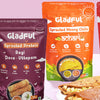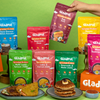
Protein is a macronutrient that is vital for child growth and development, yet research shows that one out of five kids from urban India do not meet their daily protein food intake goals.
If a child is growing slowly or is small for their age they may not be getting all the protein and nutrients needed for healthy growth. Protein deficiency can lead to some side effects down the road. This essential macronutrient provides important amino acids which helps in the overall mental and physical growth of your child.
What happens if a child’s diet lacks protein?
We know that children need nutrient dense foods which provide them with a good amount of protein, vitamins and minerals to support healthy growth and development. Many sources of protein provide important nutrients like vitamin E, B vitamins, zinc, iron and magnesium and it is part of nearly every cell in a child’s body. With lack of protein a child exhibit the following symptoms:
- Weakened Immune System
- Lower concentration and retention power
- Fatigue/ Lethargic behavior
- Bone/Joint pain
- Stunted Growth
Benefits of protein rich diet
Children are selective when it comes to foods, but getting them to eat a well-balanced diet is one of the prime responsibilities of a parent. Your child needs to eat a nutritious diet for his proper growth and development. And one important part of his diet should constitute protein. So here are a few benefits
- Builds muscle and promotes the growth of cells
- Boost metabolism and strengthens immune system
- Helps in the production of hemoglobin
- Amazing source of energy

How to ensure your child is consuming enough protein?
By now we know the wonders of protein. But whether or not your child is meeting his/ her daily intake of protein can still be a little overwhelming.
A child’s protein requirements depend on factors such as age, body type and weight. Until kids reach 14 years old, protein recommendations are the same for both boys and girls. In the later teen years (14–19), the protein recommendations increase slightly for boys, with the assumption that they are gaining more muscle mass and tend to weigh more than girls.
Listed below is the protein required for kids of different age groups:
- 0 to 6 months of age: 6.7 grams of protein every day
- 6 to 12 months of age: 8.8 grams of protein every day
- 1 to 3 years of age: 13 grams of protein every day
- 4 to 8 years of age: 19 grams of protein every day
- 9 to 13 years of age: 34 grams of protein every day

How To Promote Protein in Your Child's Diet?
Protein is responsible for your child's well being. It helps in the formation of enzymes as well as many hormones. Hence, it's crucial to consume a more protein rich diet. The risk of protein deficiency is higher among kids who eat a vegetarian diet, since it cuts out the powerful animal sources of protein like egg, meat, fish and poultry. Picky eaters can also have difficult time consuming protein.
Tips that would help your consume more protein rich diet:
-
Use dairy products in a fun way : All moms know how important milk is for children. But sometimes kids hate consuming milk. A very easy and interesting way to help them consume milk would be to make yummy smoothies. Adding nut butter, yogurt, nuts or chia seeds will create a very fun concoction and kids will thoroughly enjoy it.
-
Make breakfast more powerpack: High in protein chillas, sandwiches, appams and idlis could also be a very creative way for kids to intake good protein. Our dosa/chilla mixes serve contains 40g of protein & 20g of fiber in one packet which make it upto 8g of protein per serve.
-
Conscious snacking: It’s important that we choose what we eat wisely. Eating good nutritious food, and then binging on the big packets of lays won't help. This is where conscious snacking takes place. We have a wide range of protein rich cookies which are snackable, delicious and healthy. Each packet of cookies makes upto to 4g of protein per serve.
-
Add more yogurt, please: Yogurt is a probiotic food that has millions of gut-friendly bacteria and can help with the digestion process. It is also a good source of protein. You can try making a variety of foods with yogurt. Add some fruits to a cup of yogurt for instance and top it off with some tasty cereal. Your kid will also not miss his carbohydrates this way, while getting the recommended amount of protein from the yogurt.
Go nuts with nuts: Nuts and seeds are another rich source of protein and some are also rich in omega-3 fatty acids.. Gladful’s air roasted range of almonds and cashews are the perfect snack on go. They have no maltodextrin, no preservatives and no palm oil. They are the perfect amount of crunchy, crispy and salty.

 Shop All
Shop All
 NutraMilk Mix
NutraMilk Mix
 Healthy Breakfast
Healthy Breakfast
 Combos
Combos
 Healthy Gifting
Healthy Gifting
